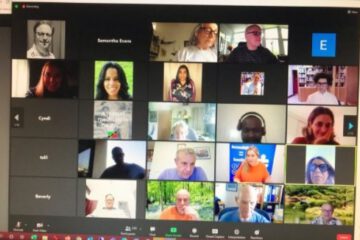Access Israel organized its 5th international webinar which focused on “Remote Employment of People with Disabilities during and post COVID-19”. More than 650 people from 82 countries registered to the webinar which was historic as for the first time a speaker of the United Arab Emirates spoke at an Israeli event
Since the beginning of the COVID19 pandemic Access Israel conducts international webinars on various topics on the challenges of people with disabilities and COVID-19 and its aftermath. Access Israel’s International Webinar focused on “Remote Employment of People with Disabilities during and post COVID-19”.
There was a lot of international interest in the webinar and for the first time, there was simultaneous translation at the webinar to Spanish, Russia, Arabic and Hebrew, which was provided by the Israeli Ministry of Foreign Affairs. This webinar was historic as for the first time a speaker of the United Arab Emirates spoke at an Israeli event on accessibility. This was historic as the peace accords signed just a few weeks ago enabled this partnership and leads the beginning of cooperation between Israel and the UAE.
More than 650 people from 82 countries registered to the webinar. It was great to see so many people from all over the world come together and learn about remote employment of people with disabilities. It was evident that the topic of remote employment of people with disabilities have become very relevant especially due to the COVID-19 pandemic and the increased move to work remotely from home during these challenging times. The speakers presented interesting solutions and approaches to ensure an accessible and inclusive manner for the remote employment for people with disabilities.
The Israeli Ambassador to the United Nations in Geneva and Alison Brown, the deputy Attache of the American Embassy in Tel Aviv greeted the virtual audience.

Wilfried Kainz, the head of Research at the Zero Project, spoke about the important work the Zero Project is doing on employment. Moreover, Hector Minto, the Senior Technology Evangelist of Microsoft presented Microsoft’s work and technologies to ensure accessibility and inclusion for employees with disabilities.
Dr. Ayesha Saeed Husainin, the Founder and director and Manzil of the UAE, spoke about their employment program PRIDE. Further, Joe Weber, the Manager of Accessibility and Solutions of Be My Eyes shares their project for an accessible workplace for people with visual disabilities. Yves Veulliet, the Global Disability and Inclusion Leader at IBM spoke about “Keeping employees with disabilities engaged in times of sanitary crisis”.
Then, a panel followed with Yuval Wagner, the founder of Access Israel; Debra Ruh, the CEO and Founder of Ruh Global Impact; Christopher Lee, the Managing Director at IAAP and Dan Goldstein a Disability Rights Advocate. They spoke about “The path to making software in the workplace accessible”. Further, Susan Scott-Parker, the CEO and Founder of the Business Disability International, gave a fascinating lecture on “How do you lip read a robot? Tackling AI powered unfair recruitment”. In addition, Corinne Weible, the Co-Director of PEAT (Partnership on Employment & Accessible Technology) shared their work on making workplace technology accessible.
Stefan Tomel, the Senior Disability Specialist at International Labor Organization (ILO) spoke about the work of the ILO and response on COVID-19. AbleDocs spoke about “Enabling employment of people with disabilities”. Furthermore, Lori Golden, Americas Abilities Strategies Leader of Ernst and Young, spoke about E&Y’s work on inclusive employment during COVID-19. The Israeli organization Skillset, represented by Maya Huber, the Co-Founder and CEO, spoke about “Innovative Israeli Technology for Employee Recruitment”. Gabi Cohen, the Director of Director Digital Accessibility Service of Migdal Or, Israel spoke about the “Case Study of Making Software Accessible for the Blind Employee”.
The webinar and its speakers gave a great insight into the available technologies and innovative projects to ensure that people with disabilities in an accessible and inclusive environment. Although the C|OVID-19 crisis creates many challenges for people with disabilities it became also evident that this crisis can create opportunity for positive change in the world of accessibility.

Thank you
Thank you to all the speakers for their time and efforts and sharing their amazing work they do.
Thank you to our Sponsors, the American Embassy in Tel Aviv, Google and Abledocs!
Thank you to the Israeli Ministry of Foreign Affairs for the simultaneous translation!
To watch the recording of the webinar, please click
here.







